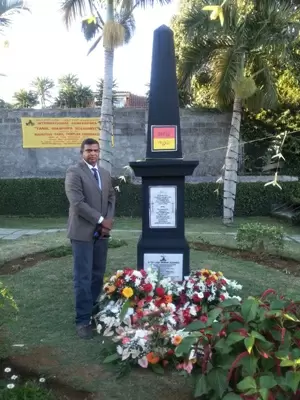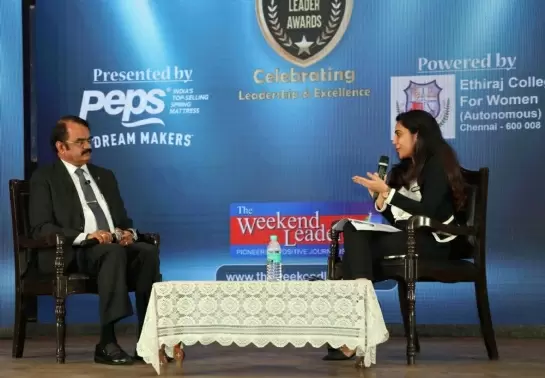Mauritius honors martyrs of Eelam war
23-November-2013

A Report of the UN panel of experts published in April 2011 stated that around 40,000 people may have been killed in the last stages of the Sri Lankan civil war which ended in May 2009. The Charles Petrie commission report which was set up to inquire the lapses on the part of UN during the war stated that around 70,000 people may have perished.
In his submission to the Lessons Learnt and Reconciliation Commission, the Bishop of Mannar put the figure at 146,679 basing his estimates from government records in Mullaitheevu and Killinochchi. While according to government records the population of Vanni in October 2008 was 429,059, as per an UN update there were only 282,380 people in the region as of 10 July 2009.
 |
|
The author at the Eelam memorial in Mauritius
|
After the conclusion of the bloody war, the Tamils of the North who lost their dear ones have even lost their right to mourn their dead.
It is estimated that nearly 40,000 members of the Liberation Tigers of Tamil Eelam (LTTE) had been killed since 1983.
The LTTE had constructed war memorials for the martyrs called ‘Maavirar Thuyalam Illam’ and in it were buried both militants and civilians who lost their lives during the war. There is not a single family in the north that was not affected by the war.
Since May 2009, the cemeteries of the members of the LTTE were razed to the ground and converted into war memorials of the Sinhala soldiers or simply turned into football fields.
In Tamil culture, people are not expected to even step on the cemetery, but today the Sri Lankan troops play football in places where thousands lay buried over a period of 30 years.
The Sri Lankan government has also issued strict orders to the people of the north not to mourn those who died in the last stages of the war.
In Sri Lanka’s south, May 18 is celebrated as ‘Victory Day’; in the north, it is a day of mourning.
In the North, today, no Tamil can openly discuss about the war or about their missing relatives. They do not have a monument for their dead ones, whereas strangers from the south have set up war memorials in their homeland.
The world is yet to recognize the losses the Tamils suffered in the course of last 30 years. The systematic genocide carried on by the Sri Lankan state since 1948 is yet to be accepted by the western world, since the West is selective about defining what constitutes genocide.
The Tamils do not even have a place to collectively mourn their dead. Their ‘Collective Right’ as a nation and people has been snatched away from them.
In this context, one needs to appreciate the Beau Bassin Rose Hill Municipal Council in Mauritius, which has erected a monument to mourn the Tamil soldiers who died in the Sri Lankan civil war.
The Mayor of Beau Bassin Rose Hill, Louis Andre Toussaint, has erected a pillar in memory of the martyrs acceding to the demands of the Mauritius Tamil Temple Federation (MTTF).
The epitaph in the memorial reads: ‘THIS MEMORIAL IS DEDICATED TO THOSE 146,679 TAMILS WHO LOST THEIR LIVES INNOCENTLY AND 40,000 REPORTED LOST IN DEFENCE OF THEIR BELOVED MOTHERLAND IN SRI LANKA’.
This monument is in the premises of the Beau Bassin Rose Hill Municipal Council just a few yards away from the office of the Mayor.
The Mayor proudly declares that Mauritius being a ‘human rights respecting country’ had no hesitation in accepting the proposal of the MTTF. The monument was declared open on 18 May 2012 to mark the third anniversary of the Mullivaikal Genocide.
In Tamil Nadu there was a similar attempt to erect a monument for those killed in the civil war. On 12 November 2013, the state government forces moved in and damaged the wall of the monument, which stands on private property.
The government claims that the monument wall was built on encroached land, but one wonders what the State was doing during the time of its construction?
In a world where Tamils live in more than 70 countries and have no country of their own, Mauritius has provided them much solace.
.webp) |
Dr. Paul Newman holds a Doctorate of Philosophy on ‘Internal Displacement and Human Rights situation in Northern Sri Lanka from Bangalore University. He was one of the four public speakers at the Permanent People’s Tribunal on War Crimes against Sri Lanka. He was recently in Mauritius to attend the International Conference on Tamil Diaspora Solidarity organized by the Mauritian Tamil Temple Federation and the International Council for Eelam Tamils from Nov 8-10.
After Six Years of Profitable Bootstrapping, Medulance Raises Rs 25 Crore to Expand Nationally
IIM Grad and First-Generation Entrepreneur Anish Popli's ProcMart Secures Rs 250 Crore in Series B Funding
First Indian Space Tourist Talks Dreams and Inspiration Before Blue Origin Flight
Former MLA Rathod Bapu Rao Switches from BJP to Congress in Telangana
Zerodha Co-Founder Nikhil Kamath Launches 'WTFund' to Support Young Entrepreneurs








